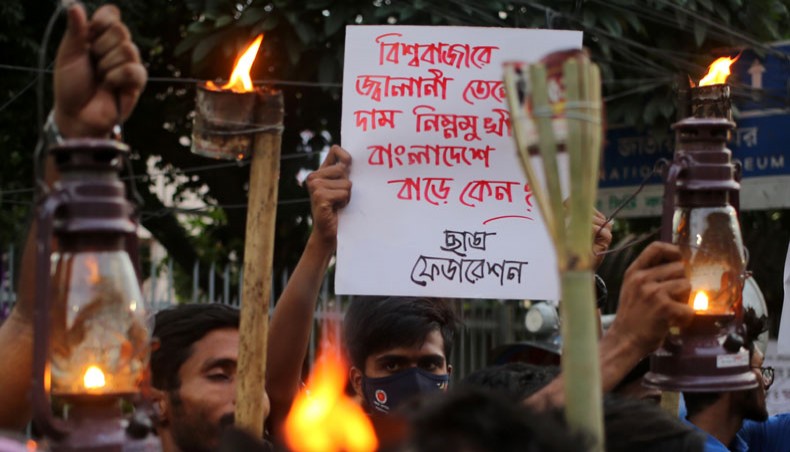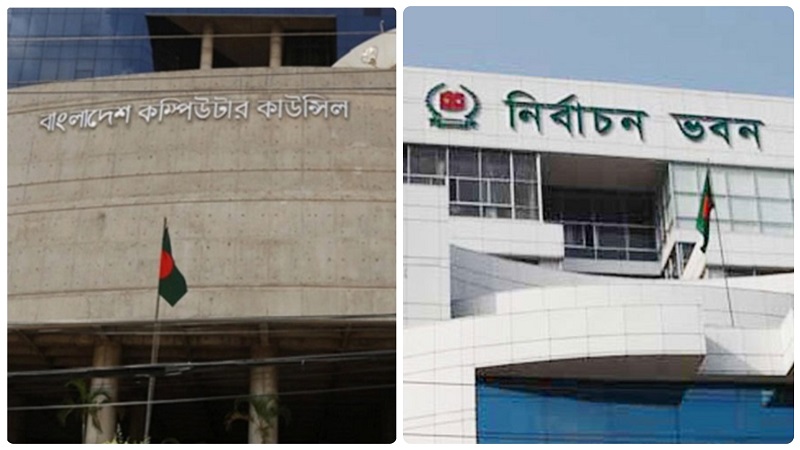The steep increase in fuel prices by the government is both illegal and unjustified, observed experts, interpreting laws and citing three specific reasons why the government should not have raised the prices, particularly when people are grappling with high prices of essentials amid the impact of the Covid pandemic.
The government in its release announcing the price hike, up to 50 per cent, justified its decision on the grounds of high prices on the international oil market, saying that it did not have any other alternative.
The fuel price hike had been in speculation since the government requested the International Monetary Fund for a financial support of reportedly $4.5 billion amid Bangladesh’s depleting foreign currency reserve and rising import cost.
The government announced the steep rise in the prices late in the evening on the weekend, bypassing the legal process of fixing energy prices, decreeing that the new prices would take effect in just two hours into its announcement.
‘I find the price hike exorbitant,’ said energy expert Professor Mohammad Tamim, adding that the current trend of fuel prices on the international market, along with forecasts, make it clear that the prices are coming down.
The crude oil price per barrel fell to $88 on August 6, according to the website Trading Economics, about $32 down compared to when the price peaked at $120 on March 8 after the war between Russia and Ukraine broke out, deepening the crisis brought on by the pandemic.
On Singapore energy market, more relevant to Bangladesh, according to the exchangerate.org.uk, the crude oil price stood at $98 on August 5, down from $125, at its peak, on March 6.
GlobalPetrolPrices.com reported that the diesel price came down to $2 on August 1 following a steady fall in July after the price peaked at $2.19 on June 20 in Singapore.
The gasoline price, on the other hand, according to the GlobalPetrolPrices.com, dropped to $2 on August 1, which reached $2.35 on June 20.
Even in the release issued on Saturday justifying its decision to hike the fuel prices, the power and energy ministry showed that the price of diesel dropped by Tk 31 a litre while the octane price by Tk 33 in July compared with June.
International media and energy forecasters said that a potential global economic slowdown led to a slump in the fuel demand. The price is falling also because of an increase in fuel supply on the international market while many countries were reducing energy consumption to avoid spending too much on energy.
‘The price is going to come down,’ Tamim said, calling the new fuel price regime in Bangladesh ‘zero-subsidy price’.
He called on the government to be transparent if it wanted to withdraw subsidies and fix a formula allowing fuel prices also to fall with the decreases in prices on the international market, which rarely happens in Bangladesh.
The Bangladesh Petroleum Corporation has profited Tk 48,122 crore over the past eight years — until May 29, 2022 — by selling fuels at prices far higher than their buying rates, according to Bangladesh Economic Review of the Finance Division.
The BPC did not reduce fuel prices even when they struck a historic low after the pandemic struck in 2020. The price of kerosene and diesel was rather increased by Tk 15 a litre to Tk 80 from Tk 65 on November 3, 2021.
The power and energy ministry said that the BPC incurred a Tk 8,014 crore loss in the five months since February 22 for selling fuels at lower-than-market prices.
‘Why should have the government increased the prices of diesel, petrol and octane in several months despite having many viable alternatives?’ asked economist Anu Muhammad in a Facebook post on Saturday.
The government could spend from the massive profit the BPC has made over the past years by overpricing fuels to allow people a break from the ever-increasing living cost, he observed, adding that the government could withdraw the import tax on fuels as well.
What is the point in increasing the prices of petrol and octane when Bangladesh has a surplus of these items from domestic sources as the prime minister informed people just a few days ago? wondered Anu Muhammad.
On July 27, prime minister Sheikh Hasina at an event announced having a surplus of petrol and octane, indicating no need to import them, saying that the country gets these fuels as by-products of gas extraction.
Octane and petrol saw the largest hike in price by Tk 46 and Tk 44 a litre respectively, as their new prices have been fixed at Tk 135 and Tk 130.
The price of each litre of diesel and kerosene has been increased by Tk 34 a litre. The ministry claimed that the BPC would incur a Tk 8 loss per litre even after announcing new prices.
According to Petrobangla and BPC officials, about 7,000 barrels of condensates, produced every day at local gas fields, are more than enough to meet the demand for petrol and almost enough to meet the demand for octain













